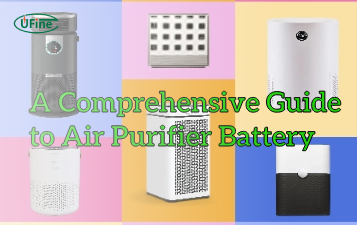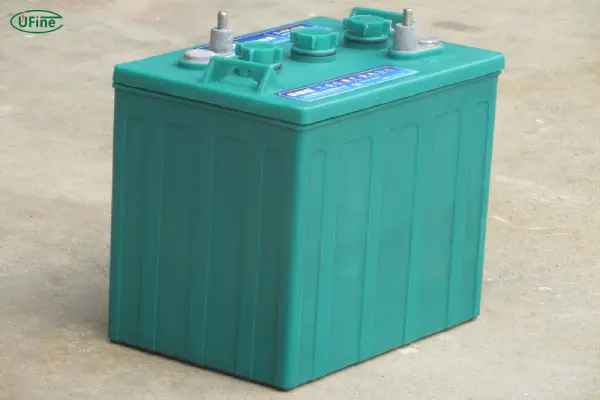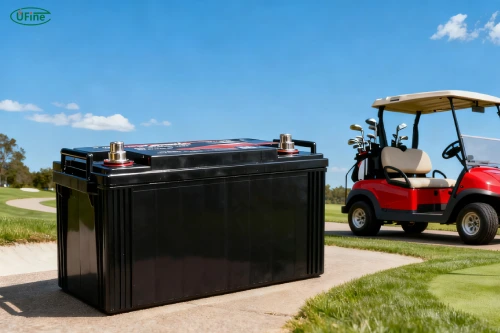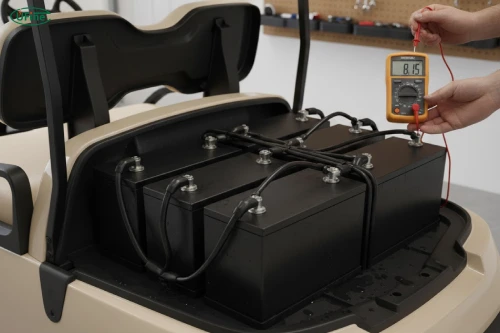
- Part 1. What exactly is an 8 volt golf cart battery?
- Part 2. 6V vs 8V vs 12V: what’s the practical difference?
- Part 3. How many 8 volt golf cart batteries do you need?
- Part 4. Key specs that actually matter
- Part 5. 8 volt golf gart battery prices (2026)
- Part 6. Best 8 volt golf cart batteries in 2026
- Part 7. How long do 8 volt golf cart batteries last?
- Part 8. Maintenance: what to expect
- Part 9. 8V lead‑acid vs lithium: when does an upgrade make sense?
- Part 10. FAQs
If you’re looking into 8 volt golf cart batteries, chances are you’re trying to answer a pretty simple question: Are 8V batteries the right fit for my golf cart?
This guide keeps things straightforward and practical. No over-selling, no jargon overload—just clear answers, real comparisons, and up‑to‑date pricing to help you decide with confidence.
Part 1. What exactly is an 8 volt golf cart battery?
An 8 volt golf cart battery is a deep‑cycle battery designed to deliver steady power over long periods. Compared with 6V and 12V options, 8V batteries sit right in the middle—offering stronger torque than 6V batteries, but better range consistency than most 12V setups.
In real-world use, that balance is the main reason 8V batteries remain popular.
In short:
- Choose 8V batteries if you want solid hill‑climbing power without sacrificing too much runtime.
- They’re most commonly used in 48V golf carts, which typically require six 8‑volt batteries connected in series.
Part 2. 6V vs 8V vs 12V: what’s the practical difference?
On paper, voltage differences look minor. In practice, they noticeably affect how your cart feels on the course.
| Battery Type | Typical Setup | Torque Feel | Runtime | Maintenance | Best Fit |
|---|---|---|---|---|---|
| 6V Batteries | 6 × 6V (36V) or 8 × 6V (48V) | Smooth and steady | Long | Higher | Flat courses, long rounds |
| 8V Batteries | 6 × 8V (48V) | Stronger, responsive | Balanced | Moderate | Hilly terrain, daily use |
| 12V Batteries | 4 × 12V (48V) | Quick bursts | Shorter | Lower | Light use, speed-focused carts |
So why do many golfers land on 8V?
Simply put, they deliver noticeably better climbing power than 6V without the range drop that often comes with 12V systems.
Part 3. How many 8 volt golf cart batteries do you need?
Most modern carts run on 48 volts, which means:
48V system = 6 × 8 volt golf cart batteries
That’s also why you’ll often see “8 volt golf cart batteries 6 pack” listings. Replacing all six batteries at once helps ensure:
- Even charging and discharge
- Consistent voltage output
- Longer overall battery life
Mixing old and new batteries may save money short‑term, but it often leads to uneven wear and early failure.
Still unsure which golf cart battery type is best for your needs? This breakdown compares flooded, gel, AGM, and lithium batteries in real-world golf cart use.
Part 4. Key specs that actually matter
Not every specification deserves equal attention. When shopping for 8V golf cart batteries, these are the numbers worth focusing on:
- Capacity (Ah): Typically 150–170Ah for quality models
- Cycle Life: Around 700–1,000 cycles for flooded lead‑acid
- Weight: Usually 60–70 lb per battery
- Battery Type: Flooded lead‑acid or AGM
According to data published by Battery University, deeper discharge cycles significantly reduce lead‑acid lifespan—another reason capacity and usage habits matter more than headline voltage alone.
Since most 8 volt golf cart batteries are used in 48V systems, this 48V golf cart battery guide walks you through how to choose the right setup for your cart and driving style.
Part 5. 8 volt golf gart battery prices (2026)
Prices haven’t changed dramatically, but brand and battery type still make a noticeable difference.
| Battery Type | Average Price (Per Battery) | Typical Lifespan | Maintenance |
|---|---|---|---|
| Flooded Lead-Acid | $90 – $120 | 3–5 years | Watering required |
| AGM | $130 – $180 | 5–7 years | Maintenance-free |
6‑Pack Pricing
- Flooded lead‑acid (6 pack): $540–$700
- AGM (6 pack): $780–$1,050
A lifecycle cost comparison published by Trojan Battery shows that proper maintenance alone can extend flooded battery life by up to 30%.
Part 6. Best 8 volt golf cart batteries in 2026
Based on durability, cycle ratings, and long‑term user feedback, these models continue to stand out:
| Brand | Model | Type | Key Strength |
|---|---|---|---|
| Trojan | T-875 | Flooded Lead-Acid | Proven lifespan and consistency |
| US Battery | US8VGC | Flooded Lead-Acid | Deep-cycle durability |
| Crown | CR-165 | Flooded Lead-Acid | Strong value for daily use |
| Interstate | 8VGC8 | AGM | Maintenance-free convenience |
| Duracell | GC8 AGM | AGM | Simple ownership, solid warranty |
None of these are “magic batteries”—but they’re consistently reliable, which matters far more in daily use.
Part 7. How long do 8 volt golf cart batteries last?
With normal use and decent care:
- Flooded lead‑acid: 3–5 years
- AGM: 5–7 years
Charging after each round, avoiding deep discharges, and keeping terminals clean can easily add one extra year or more to a full set.
Part 8. Maintenance: what to expect
| Battery Type | Charging Time | Self-Discharge | Maintenance Needs |
|---|---|---|---|
| Flooded Lead-Acid | 8–10 hours | 4–6% / month | Regular watering |
| AGM | 6–8 hours | 2–3% / month | None |
The U.S. Department of Energy notes that proper charging practices reduce sulfation and extend lead‑acid battery life significantly (DOE battery guidance).
Battery performance isn’t just about the batteries themselves—properly sized and maintained golf cart battery cables play a huge role in efficiency and longevity.
Part 9. 8V lead‑acid vs lithium: when does an upgrade make sense?
Lithium batteries get a lot of attention—and for good reason. They’re lighter, charge faster, and require zero maintenance.
If you’re debating between traditional deep cycle batteries and newer lithium golf cart batteries vs deep cycle batteries, this comparison breaks down the real-world pros and cons of each.
That said, switching from 8V lead‑acid to lithium only makes sense if you’re planning a full system upgrade, including charger compatibility. For many golfers, a high‑quality 8V AGM setup remains the most cost‑effective and hassle‑free choice.
Final takeaway: If you want a dependable mix of power, range, and reasonable ownership costs, 8 volt golf cart batteries remain a smart, proven choice in 2026.
Part 10. FAQs
How many 8 volt batteries does a golf cart need?
Most 48V carts require six 8‑volt batteries.
Can I replace 6V batteries with 8V batteries?
Only if your cart is designed for a 48V configuration using 8V batteries.
Are 8V batteries better for hills?
Yes. Many users notice stronger torque and smoother climbing compared with 6V systems.
Related Tags:
More Articles

A Comprehensive Guide to Air Purifier Battery
Learn how to choose the right air purifier battery by comparing battery types, lifespan, and selection criteria for portable and industrial air purifiers.
10 Popular LiFePo4 Battery Price Comparison 2026
Find the most affordable option with the best features and warranty. Top 10 LiFePO4 price comparisons will help you choose your perfect LiFePO4 battery.
The Ultimate Guide to 12V 100Ah Lithium Battery
Learn what a 12V 100Ah lithium battery is, its specs, advantages over lead-acid, and common uses in RV, marine, and solar systems.
Group 31 Battery Size, Dimensions & Types Complete Guide
Learn everything about Group 31 batteries – dimensions, weight, types, and which battery is best for marine, RV, or industrial use.
Top 10 Lightweight Car Battery Options for Enhanced Performance
Compare the top 10 lightweight car batteries for 2026. Explore lithium, LiFePO4, and AGM options by weight, CCA, lifespan, and real-world applications.





